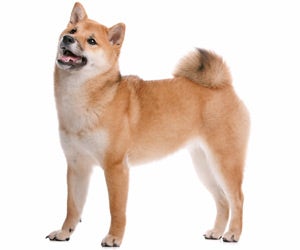Shiba Inu
-
Overview
Shiba Inus are the smallest member of the Japanese Spitz family. They share many characteristics with their larger Northern Spitz relatives, including their beautifully curled tails, prick ears, and alert, almost cocky facial expressions.
Shiba Inus are noble little dogs who carry themselves proudly and prefer outdoor play to indoor socialization. They are agile, athletic dogs who bond closely to their family and must be trained to appreciate strangers and new faces.
-
Personality
The Shiba Inu carries himself with a calm dignity, which makes him reserved indoors. Shiba Inus are energetic and more lively outside, where they love to explore, run and jump. Although he is a perky, affable dog, he is not overly eager to meet strangers or other pets. In fact, he can be slightly dog aggressive and a little aloof, so Shiba Inus benefit greatly from early socialization and dominance training. These little dogs are quite self-satisfied, which makes them independent free spirits who aren't necessarily striving to please their owners. Although they are intelligent, they like to act on their own volition, so it might take some effort to teach commands to them originally. Shiba Inus will love to feel as if training was their idea, so make sure they are mentally stimulated.
These little dogs only weigh about 20 pounds, but they are territorial and possessive. They will not be pleased to share toys, food or even space. This makes them excellent guard dogs and loyal family members, but they will have to be taught to share space with other dogs so they do not become too aggressive or anti-social.
-
Coat Care
Shiba Inus have long, curly tails that curl up over their backs and are covered in long, soft hair. Their thick double coat sheds throughout the year. They completely blow their coat twice a year, when their shedding is much more extreme. Their stiff, straight over coat gives the coat its texture and the soft, dense undercoat gives the coat its shape. They also have wiry, firm guard hairs that originally served to protect them while they worked and hunted outdoors. Their coats are generally available in three distinct colors and variations of the three shades. Shiba Inus have a cream-colored (urajiro) undercoat. Their outer coats are either red or orange-red, black, or sesame, which is reddish with black tips. Occasionally, Shiba Inus have white markings on the tips of the tail or face, but they usually do not vary from the three standard colorations. Not only do these nimble little dogs have cat-like reflexes, they are notoriously tidy and sometimes groom themselves like cats do.
Shiba Inus are hilariously fastidious in their grooming habits. They often lick their paws and faces clean, especially after a romp in the yard or a meal.

Shiba Inus have thick coats that will benefit from a weekly brushing with a strong pin brush to help distribute healthy hair and remove dead hairs.
Shiba Inus are considerate in their grooming habits. They take care of quite a few of their bathing needs on their own and save their owners a lot of time.
If their hair around the Shiba Inus ears becomes overly long, trim carefully around the ears to prevent infection.
Shiba Inus also need to have their nails trimmed routinely.
If the hair around the Shiba Inus ears becomes overly long, trim carefully around the ears to prevent infection.
Many owners do not realize how important it is to brush your pet’s teeth on a regular basis. Some dogs are prone to dental problems and sensitive teeth, especially small dogs with tiny teeth and dogs with special diets. These problems can be easily combatted with frequent brushing.
Cavities are rare with dogs but gum disease caused by tartar buildup is not, which is why they require regular brushing with toothpaste and a toothbrush formulated specifically for dogs. While daily brushing is ideal, doing so on a weekly basis will be a big help in avoiding the need to bring your dog to a veterinarian for a cleaning, which usually has to be done under sedation.

 India (English)
India (English)
 Middle East and Africa (English)
Middle East and Africa (English)
 South Africa (English)
South Africa (English)
 Australia (English)
Australia (English)
 Japan (日本語)
Japan (日本語)
 South East Asia (English)
South East Asia (English)
 Singapore (English)
Singapore (English)
 Europe (English)
Europe (English)
 United Kingdom (English)
United Kingdom (English)
 Argentina (Español)
Argentina (Español)
 Brazil (Portuguese)
Brazil (Portuguese)
 Colombia (Español)
Colombia (Español)
 Latin America (Español)
Latin America (Español)
 México (Español)
México (Español)
 Chile (Español)
Chile (Español)
 Peru (Español)
Peru (Español)
 Canada (English)
Canada (English)

